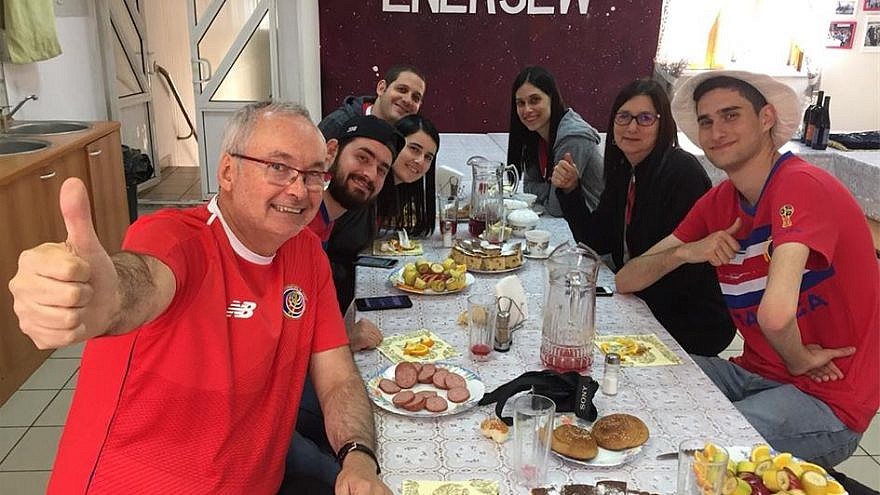They came for the World Cup and stayed for Shabbat
Thousands from around the globe came to Russia and are learning that Judaism there isn’t just history
By Dovid Margolin
(Chabad.org/News via JNS) Until two weeks ago, Alberto Galante had never been to Russia. The 2018 FIFA World Cup drew him to Moscow, St. Petersburg, and Rostov-on-Don, where he cheered on Mexico’s national soccer team as they advanced through the competition. While Galante—who traveled with his son and friends—was thrilled to see Mexico stun the world in its upset win over defending World Cup champion Germany, that was not the only happy surprise of his 12-day trip: He also got to see living, breathing Jewish life in Russia, which not only left him impressed, but inspired.
There are at least 10,000 Israelis among the 1 million soccer fans who have descended upon Russia for the World Cup, but that number does not reflect the thousands of Jewish visitors who have come from all around the world, especially from Latin America.
Weisberg met with FIFA president Gianni Infantino in the runup to the games, sharing with him the Jewish community’s World Cup plans throughout Russia. MJCC, the seven-story heartbeat of Jewish life in Moscow, has a dedicated, multi-lingual information center for visitors, and is home to multiple kosher restaurants, including Shtetl. A pleasant outdoor restaurant seating area with screens showing games throughout the country has been set up on the property of the Jewish center, where fans are able to sip a kosher cappuccino while keeping up with the matches. Since the start of the games, each Shabbat has seen hundreds join for big Shabbat meals, and more than 1,000 are expected for the Shabbat before the finals.
But it was Galante’s visit to Rostov, where Mexico beat South Korea, that struck him most. “Where else do you meet a Jew who made the decision to have a brit milah at age 63?” he marvels. In Rostov, Galante met many more Mexican Jewish fans, some of whom he knew and others he didn’t.
“It’s definitely brought a lot of excitement,” says Rostov’s chief rabbi Chaim Danzinger, who also directs Chabad of Rostov. Prior to the games, Danzinger recorded a short video welcoming Jewish visitors to the historic city that he and his family have called home for a decade. The video caught fire on social media and WhatsApp, turning him into a minor celebrity among tourists. “People have been recognizing and coming up to me in the streets, pulling out their phones to show how they know about me.”
Rostov’s restored synagogue is just across the Don River from Rostov Arena, where the games are being played, making it a convenient stop for Jewish visitors. Galante stayed in a hotel quite a distance from the synagogue, and so on Friday night—while some 100 guests gathered for a large meal and farbrengen at the synagogue—made kiddush in his room on wine provided to him by the rabbi. The next day, he walked an hour-and-a-half, joining others for a Shabbat meal at the rabbi’s home.
From West to East
Two thousand miles separate Kaliningrad, Russia’s European outpost, and Ekaterinburg, its gateway to Siberia. In both cities, Chabad emissaries have opened their doors to welcome Jewish fans.
Since 1998, Rabbi David and Avital Shvedik have been a key part of reestablishing Jewish life in Kalningrad, which was the East Prussian city of Königsberg until the end of World War II. The city has a long and lustrous Jewish history, but was utterly destroyed during the war. The choral synagogue was ravaged on Kristallnacht, and the Jewish community deported in 1942. Recently, the Jewish community received the land upon which the choral synagogue once stood, and a full reconstruction of the historic structure is underway. A new 23-ton dome was lowered onto the structure earlier this year, which is timed to be completed this November—80 years since the events of Kristallnacht.
At the other end of the World Cup map, in Ekaterinburg, Rabbi Zelig Ashkenazi, the chief rabbi of Russia’s fourth-largest city, has experienced a similar phenomenon.
Ekaterinburg’s impressive Rohr Chabad community center is located in the center of the city and includes a synagogue, men’s and women’s mikvahs, and a soup kitchen.
Galante, who returned home to Miami this week, sums up the general feeling he, his group, and the other Jews he spoke with felt regarding Jewish life in Russia: “It is extraordinary.”
This article was originally published at Chabad.org/News.
Published on Wed, 27 Jun 2018 15:35:59 +0000.
